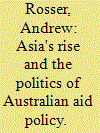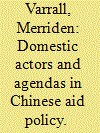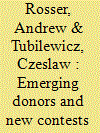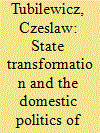|
|
|
Sort Order |
|
|
|
Items / Page
|
|
|
|
|
|
|
| Srl | Item |
| 1 |
ID:
143633


|
|
|
|
|
| Summary/Abstract |
The economic rise of developing Asia has given impetus to debates over the geographic orientation, strategy, organisation, and collaborative relationships of the Australian aid programme. This paper examines these debates, Australian government responses, and the politics underlying these responses. It points to, among things, the different ways in which the Labor Party and the Liberal–National Coalition have dealt with these issues, reflecting their different constituencies and foreign policy philosophies. The paper also assesses the future trajectory of Australian aid policy, in particular, the extent to which it is embracing the Chinese model of aid.
|
|
|
|
|
|
|
|
|
|
|
|
|
|
|
|
| 2 |
ID:
143629


|
|
|
|
|
| Summary/Abstract |
As China's aid has increased, so has scrutiny by the international development and foreign policy community. Despite recognition that foreign aid policy is a result of domestic political contests, the existing literature tends to overlook Chinese debates about the purpose of aid, and how that purpose should be achieved. This paper argues that examining these debates shows that Chinese aid is not a well-considered element of an overarching strategy. Rather, where foreign aid is considered relevant vis-à-vis China's goals, its use is hotly contested. Competing actors' varying agendas, rather than any coherent strategy, underpin inchoate aid projects.
|
|
|
|
|
|
|
|
|
|
|
|
|
|
|
|
| 3 |
ID:
143631


|
|
|
|
|
| Summary/Abstract |
The paper examines the domestic politics surrounding South Korea's foreign aid policy. It delineates the institutional characteristics and strategic interests of key government and non-government stakeholders, and suggests an analytical framework to comprehend the country's aid policy regime. It suggests that two competing policy discourses exist – one emphasising ‘intellectual leadership’ and the other ‘ethical leadership’ as the key principle of aid policy. In practice, the country's political leadership promulgates a complex amalgam of these discourses in alignment with their own political imperatives and interests. The paper discusses ‘Global Saemaul Undong’ as such an example under the incumbent Park Geun-Hye administration.
|
|
|
|
|
|
|
|
|
|
|
|
|
|
|
|
| 4 |
ID:
143628


|
|
|
|
|
| Summary/Abstract |
The rise of emerging donors has unleashed new political contests over aid policy, some of which have occurred at the domestic level. This article locates the special edition's analysis of these contests within the existing literature on emerging donors, draws out the key findings of included papers, and considers their implications for policy. It argues that domestic contests have had significant influence over aid policy in both emerging and established donors, the agendas at work have varied from case to case reflecting countries' different political economies, and aid policies represent a ‘work-in-progress’ rather than an expression of immutable models.
|
|
|
|
|
|
|
|
|
|
|
|
|
|
|
|
| 5 |
ID:
143632


|
|
|
|
|
| Summary/Abstract |
Domestic and international contests explain the transformation of Japan's foreign aid programme begun in the early 1950s. Through contests between domestic players, Japan has streamlined its aid processes by introducing institutional innovations, accommodating new actors in aid policy and delivery, and responding more sensitively to public opinion and independent advice. At the international level, contests have come from the Development Assistance Committee/Organization of Economic Cooperation and Development (DAC/OECD), the USA, and China. Through these contests, Japan has emerged as a more rounded aid donor. Its new aid model blends Western principles with concepts of ‘self-help’, favouring large infrastructure projects that serve both Japan's and recipient countries’ interests.
|
|
|
|
|
|
|
|
|
|
|
|
|
|
|
|
| 6 |
ID:
143630


|
|
|
|
|
| Summary/Abstract |
This article challenges the dominant narrative that overlooks the role of domestic factors in Taiwanese foreign aid in favour of politics cast at the cross-Strait and international levels. It examines the emergence and effects of partisan politics on Taipei's foreign aid policies, including aid budgets and the motivation for providing foreign aid. It argues that, rather than the cross-Strait conflict as such, it was contests and rivalries among Taiwan's political parties and government agencies – underpinned by ongoing projects of state building – that shaped the variable objectives, policies and processes of Taipei's foreign aid-giving.
|
|
|
|
|
|
|
|
|
|
|
|
|
|
|
|
|
|
|
|
|